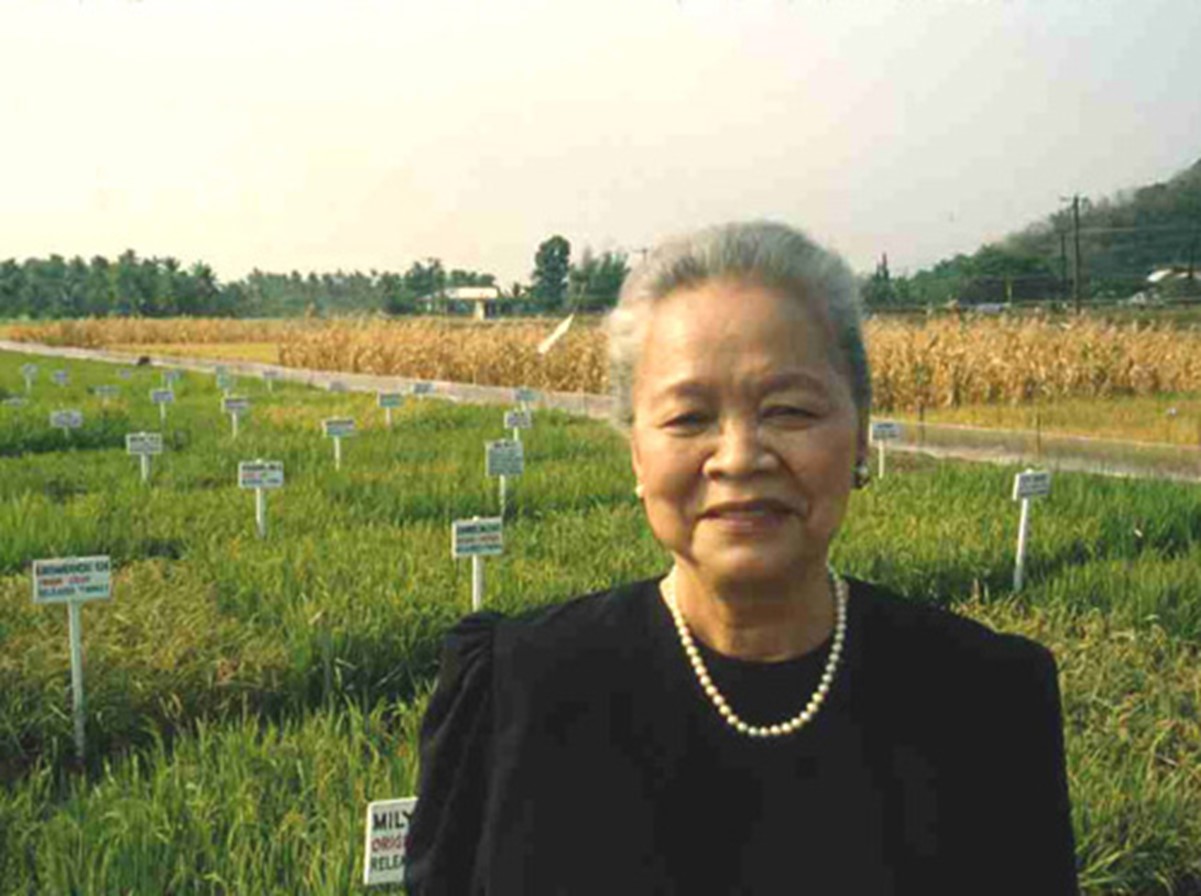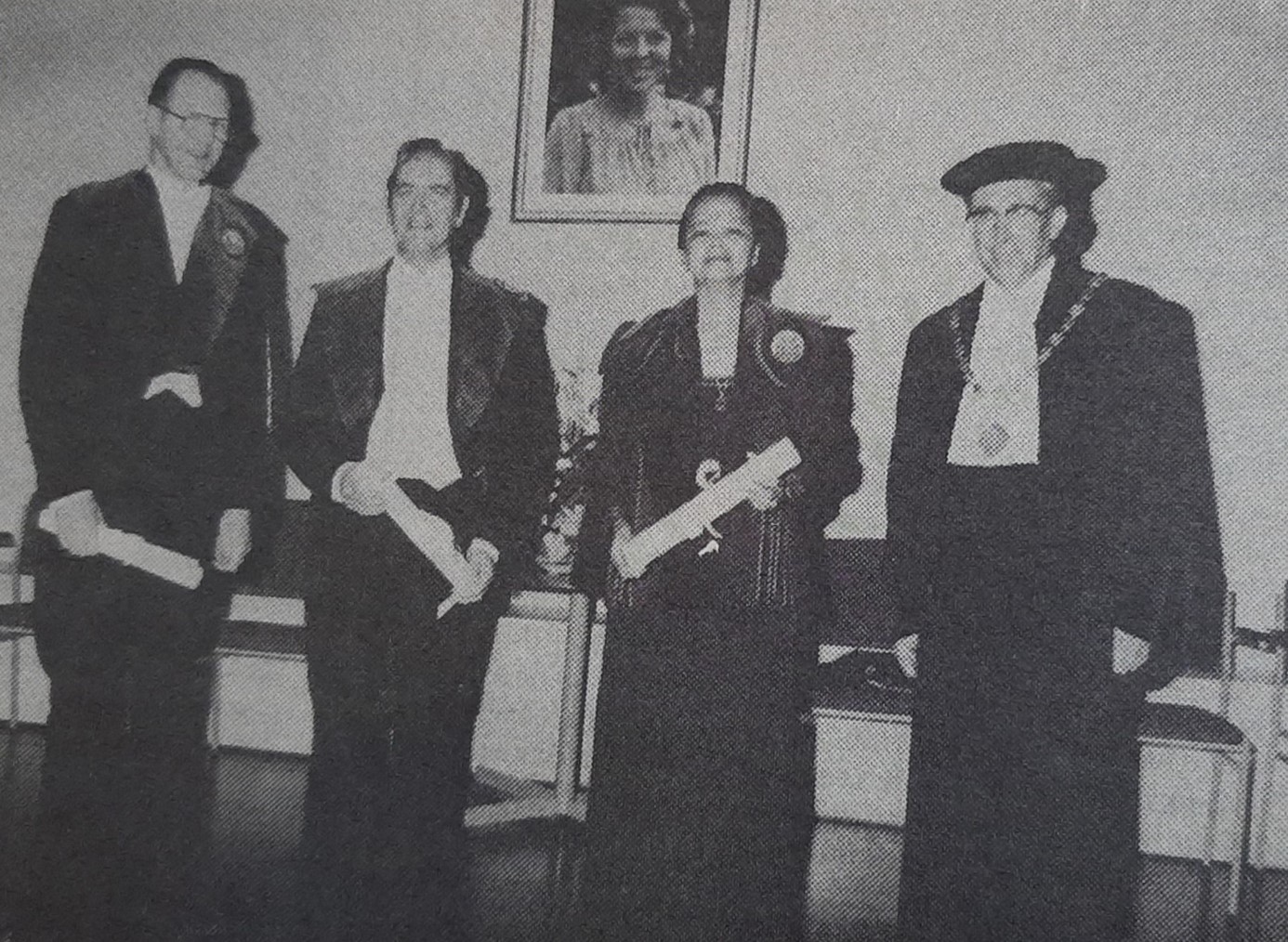
Longread
Gelia Castillo, second woman honorary doctor Wageningen University (1983)
Gelia Castillo was the second woman who received an honorary doctorate from Wageningen University in 1983. Being born and based in the Philippines, she was actually the first woman from outside the Western world. This portrait is part of the series Inspirational Women from the Past at WUR.
Prof. Dr Gelia Tagumpay Castillo (1928-2017) started her international career as a rural sociologist graduated from Penn State University and Cornell. After her return to the College of Agriculture, University of the Philippines Los Baňos (UPLB) in 1960, she stepped up to a full professorship followed by a university professorship (resp. 1972 and 1988). While continuing her work both in the Philippines and internationally, she received many awards. However, her key role in evidence-based support for women in rice farming systems, which started in the 1980s, is not well acknowledged yet. UPLB’s neighbour IRRI (International Rice Research Institute) greatly benefited from her advice as a long-time consultant till she reached the age of 85 in 2013.
Many of her publications are worthwhile revaluing for their importance today. She contributed to overcoming Western bias and to interdisciplinary and multi-level participatory partnerships and tools. After IRRI was built near UPLB in 1960, Gelia became a much-appreciated ally as a social scientist among life scientists. Within the CGIAR, she became the first woman Chair of a Board of Trustees at CIP (International Potato Centre, Peru) in 1983.
Both nationally and internationally, she served on many boards and review committees and was honoured many times. Her 11 years on the Board of Governors of the Canadian agency IDRC (1979-1990) are certainly noteworthy. As Prof. Emerita after 1993, she continued participating until she reached the age of 85 in 2013. CIP colleagues praised her as a constant source of advice and inspiration. IRRI Director Matthew Morell recalled her intellectual vitality, lifelong curiosity, and passion for knowledge. Those who met her either as a colleague or supervisor, remember her wise, nuanced, sharp and inspiring presence. She has clearly been sorely missed since her passing in 2017.
Her profound interest in rice
As a sociologist focussing on the rural areas, Gelia acknowledged the importance of rice. As it was central to farming and food, it was key to research and development: “Perhaps it’s because it’s something that we eat every day. We can’t do without it, and it’s something that you find among both rich and poor, and you can’t ignore it. It’s always there; no matter what happens, it’s always there. If it’s not there, you better find it, you know.” However, when IRRI became the UPLB’s neighbour in the 1960s, there were worries and doubts.

IRRI-8: Miracle Rice?
Her curiosity about rice and IRRI might have inspired her to the media analysis of IR8, IRRI’s first high-yielding variety (HIV), launched in 1966. She exposed how IR8 was dubbed Miracle Rice in the press. This marked it as a milestone in the Green Revolution. The media highlighted that IRRI-8 would bring abundant yields and profits. In contrast, Gelia Castillo quoted the rather modest researchers on its shortcomings and limitations. She concluded that ideology led the media rice debates: “For although a grain of rice is a grain of rice, the men who eat rice, grow rice, buy rice, develop rice, and write about rice; all have some sort of “ideology”, even if it comes in the guise of "gossip in the agricultural circuit". The miracle seems to have vanished as IR8 was later mocked as Cadillac Rice to express its US connection and unaffordability.
Synthesis reviews in Asian contexts
The controversy over the new varieties led her to the book All in a Grain of Rice, published in 1975. She reviewed the social and economic impacts and implications of the new rice varieties and technologies. It is an example of a critical synthesis that well contextualised and differentiated empirical data. She argued that such studies were needed in both the Philippine and Asian contexts. These would build evidence-based knowledge and identify knowledge gaps beyond the existing Western concepts or studies. She did the same whenever writing about youth, women, or farming families in unfavourable conditions.
Sketching the Ideal Rural Sociologist
Most publications show another keenness of her to stress and elaborate on how to combine action, policy, research, and theory in an interdisciplinary and multi-level participatory way. In 1964, she first sketched the ideal rural sociologist. For development contexts, she emphasised the need to re-examine old (western) concepts about traditional societies and connect action programmes to research and theory. She called for learning more about practitioners and strengthening communication with action workers and policymakers. To this end, she considered expert preparation in rural sociology a requirement.
Integrated gender approach
Gelia Castillo’s support has been key to the inclusion of women in IRRI’s research and development efforts through combining these insights. Under director MS Swaminathan, IRRI was the first CGIAR institute to organise a women’s conference in 1983. This Women in Rice Farming Systems conference led to the WIRFS (Women in Rice Farming Systems) programme. It was integrated into the Asian Rice Farming Systems Network (ARFSN) to secure interdisciplinarity and used participatory methods to include women’s perspectives. Later, Gelia argued to integrate former gender specific domains fully: “There is no reason why nutrition, population education, hygiene and sanitation should not be introduced to the men of the household in the same way that we argue for the importance of women learning more about modern agricultural technology whether or not they are physically involved in farming. Farm and household decisions are not independent of each other (…).”

Honoured in Wageningen 1983
On 9 March 1983, Prof. Dr Gelia Castillo received an honorary doctorate from Wageningen by Prof. Dr ir. Dirk van Dusseldorp, professor of Rural Sociology on the Tropics and Subtropics. The WUR magazine of that time, Wagenings Hogeschoolblad, announced a seminar on Technology transfer in an imperfect world with her and printed a full-page interview. It articulated her engagement with the actual food situation, the position of rural women and the functioning of agricultural education and extension. When asked to evaluate the Green Revolution, Gelia acknowledged that the new technologies gave little or hardly any support to families farming under less favourable conditions. However, she rejected voices that solely blamed technology for worsening their situation or that of landless rural peoples, women, or the urban poor. She urged Western researchers not to preach but to support developing new methods and empirical evidence. She wished Wageningen would encourage this among its students as they appeared to like to work with farmers at a practical level.
Healthy research partnership: beyond colonial history and life sciences
In a more extensive reflection on research partnerships, Gelia noted their North-South patterns of colonial history that could easily work out as exploitative. She portrayed ‘unhealthy’ partnerships in five types. Mutual interest and trustfulness appeared most decisive. However, South-South partnerships were not better per se, as regions hugely differed. Another type of research partnership exists between international and national agricultural research systems (NARS). As NARS were often considered too weak, Gelia lined out how to overcome 'partnership syndrome'. Lastly, interdisciplinarity had its own challenges when building cooperation between life scientists and anthropologists, sociologists and economists. Finally, she shared her experience that partnerships needed time to mature and high leadership qualities to endure. Let us end with a final statement: “When the best of science and scientists are devoted to the problems of those who have less in life, science brings equity and humanity to development. In our search for sustainability, science also forges an alliance with indigenous knowledge. Even the 'weak' can contribute to the 'strong'.”